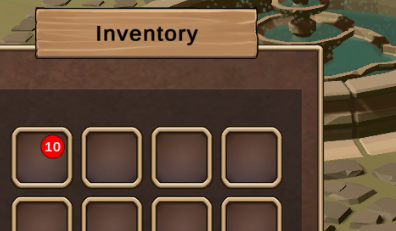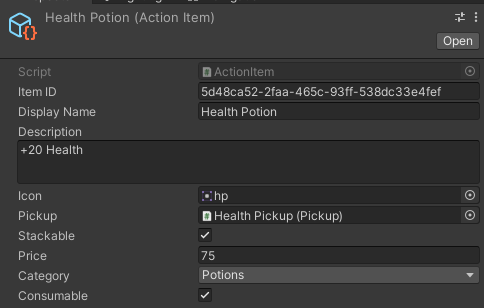Hi All,
The game crashes when trying to load.
I am returning the following error. I think its to do with the dictionary not allowing a null value?
When I start a game (with no save), move to the shop and buy something, then save it all works. If I exit out of play mode and try to go back in, I get this error.
Can I please have some help?
Error:
ArgumentNullException: Value cannot be null.
Parameter name: key
System.Collections.Generic.Dictionary2[TKey,TValue].TryInsert (TKey key, TValue value, System.Collections.Generic.InsertionBehavior behavior) (at <6073cf49ed704e958b8a66d540dea948>:0) System.Collections.Generic.Dictionary2[TKey,TValue].set_Item (TKey key, TValue value) (at <6073cf49ed704e958b8a66d540dea948>:0)
RPG.Shops.Shop.RestoreState (System.Object state) (at Assets/Scripts/Shops/Shop.cs:390)
GameDevTV.Saving.SaveableEntity.RestoreState (System.Object state) (at Assets/Scripts/Saving/SaveableEntity.cs:64)
GameDevTV.Saving.SavingSystem.RestoreState (System.Collections.Generic.Dictionary`2[TKey,TValue] state) (at Assets/Scripts/Saving/SavingSystem.cs:106)
GameDevTV.Saving.SavingSystem+d__0.MoveNext () (at Assets/Scripts/Saving/SavingSystem.cs:34)
UnityEngine.SetupCoroutine.InvokeMoveNext (System.Collections.IEnumerator enumerator, System.IntPtr returnValueAddress) (at <40205bb2cb25478a9cb0f5e54cf11441>:0)
This is my code:
using System;
using System.Collections;
using System.Collections.Generic;
using GameDevTV.Inventories;
using GameDevTV.Saving;
using RPG.Control;
using RPG.Inventories;
using RPG.Stats;
using UnityEngine;
namespace RPG.Shops
{
public class Shop : MonoBehaviour, IRaycastable, ISaveable
{
[SerializeField] string shopName;
[Range(0, 100)]
[SerializeField] float sellingPercentage = 80f;
// Stock Config
// Item:
// InventoryItem
// Initial Stock
// buyingDiscount
[SerializeField]
StockItemConfig[] stockConfig;
[System.Serializable]
class StockItemConfig
{
public InventoryItem item;
public int initialStock;
[Range(0, 100)]
public float buyingDiscountPercentage;
public int levelToUnlock = 0;
}
Dictionary<InventoryItem, int> transaction = new Dictionary<InventoryItem, int>();
Dictionary<InventoryItem, int> stockSold = new Dictionary<InventoryItem, int>();
Shopper currentShopper = null;
bool isBuyingMode = true;
ItemCategory filter = ItemCategory.None;
public event Action onChange;
public void SetShopper(Shopper shopper)
{
currentShopper = shopper;
}
public IEnumerable<ShopItem> GetFilteredItems()
{
foreach (ShopItem shopItem in GetAllItems())
{
InventoryItem item = shopItem.GetInventoryItem();
if (filter == ItemCategory.None || item.GetCategory() == filter)
{
yield return shopItem;
}
}
}
public IEnumerable<ShopItem> GetAllItems()
{
Dictionary<InventoryItem, float> prices = GetPrices();
Dictionary<InventoryItem, int> availabilities = GetAvailabilities();
foreach (InventoryItem item in availabilities.Keys)
{
if (availabilities[item] <= 0) continue;
float price = prices[item];
int quantityInTransaction = 0;
transaction.TryGetValue(item, out quantityInTransaction);
int availability = availabilities[item];
yield return new ShopItem(item, availability, price, quantityInTransaction);
}
}
public void SelectFilter(ItemCategory category)
{
filter = category;
print(category);
if (onChange != null)
{
onChange();
}
}
public ItemCategory GetFilter()
{
return filter;
}
public void SelectMode(bool isBuying)
{
isBuyingMode = isBuying;
if (onChange != null)
{
onChange();
}
}
public bool IsBuyingMode()
{
return isBuyingMode;
}
public bool CanTransact()
{
if (IsTransactionEmpty()) return false;
if (!HasSufficientFunds()) return false;
if (!HasInventorySpace()) return false;
return true;
}
public bool HasSufficientFunds()
{
if (!isBuyingMode) return true;
Purse purse = currentShopper.GetComponent<Purse>();
if (purse == null) return false;
return purse.GetBalance() >= TransactionTotal();
}
public bool IsTransactionEmpty()
{
return transaction.Count == 0;
}
public bool HasInventorySpace()
{
if (!isBuyingMode) return true;
Inventory shopperInventory = currentShopper.GetComponent<Inventory>();
if (shopperInventory == null) return false;
List<InventoryItem> flatItems = new List<InventoryItem>();
foreach (ShopItem shopItem in GetAllItems())
{
InventoryItem item = shopItem.GetInventoryItem();
int quantity = shopItem.GetQuantityInTransaction();
for (int i = 0; i < quantity; i++)
{
flatItems.Add(item);
}
}
return shopperInventory.HasSpaceFor(flatItems);
}
public void ConfirmTransaction()
{
Inventory shopperInventory = currentShopper.GetComponent<Inventory>();
Purse shopperPurse = currentShopper.GetComponent<Purse>();
if (shopperInventory == null || shopperPurse == null) return;
// Transfer to or from the inventory
foreach (ShopItem shopItem in GetAllItems())
{
InventoryItem item = shopItem.GetInventoryItem();
int quantity = shopItem.GetQuantityInTransaction();
float price = shopItem.GetPrice();
for (int i = 0; i < quantity; i++)
{
if (isBuyingMode)
{
BuyItem(shopperInventory, shopperPurse, item, price);
}
else
{
SellItem(shopperInventory, shopperPurse, item, price);
}
}
}
// Removal from transaction
// Debting or Crediting of funds
if (onChange != null)
{
onChange();
}
}
public float TransactionTotal()
{
float total = 0;
foreach (ShopItem item in GetAllItems())
{
total += item.GetPrice() * item.GetQuantityInTransaction();
}
return total;
}
public string GetShopName()
{
return shopName;
}
public void AddToTransaction(InventoryItem item, int quantity)
{
if (!transaction.ContainsKey(item))
{
transaction[item] = 0;
}
var availabilities = GetAvailabilities();
int availability = availabilities[item];
if (transaction[item] + quantity > availability)
{
transaction[item] = availability;
}
else
{
transaction[item] += quantity;
}
if (transaction[item] <= 0)
{
transaction.Remove(item);
}
if (onChange != null)
{
onChange();
}
}
public CursorType GetCursorType()
{
return CursorType.Shop;
}
public bool HandleRaycast(PlayerController callingController)
{
if (Input.GetMouseButtonDown(0))
{
callingController.GetComponent<Shopper>().SetActiveShop(this);
}
return true;
}
private int CountItemsInInventory(InventoryItem item)
{
Inventory inventory = currentShopper.GetComponent<Inventory>();
if (inventory == null) return 0;
int total = 0;
for (int i = 0; i < inventory.GetSize(); i++)
{
if (inventory.GetItemInSlot(i) == item)
{
total += inventory.GetNumberInSlot(i);
}
}
return total;
}
private Dictionary<InventoryItem, int> GetAvailabilities()
{
Dictionary<InventoryItem, int> availabilities = new Dictionary<InventoryItem, int>();
foreach (var config in GetAvailableConfigs())
{
if (isBuyingMode)
{
if (!availabilities.ContainsKey(config.item))
{
int sold = 0;
stockSold.TryGetValue(config.item, out sold);
availabilities[config.item] = -sold;
}
availabilities[config.item] += config.initialStock;
}
else
{
availabilities[config.item] = CountItemsInInventory(config.item);
}
}
return availabilities;
}
private Dictionary<InventoryItem, float> GetPrices()
{
Dictionary<InventoryItem, float> prices = new Dictionary<InventoryItem, float>();
foreach (var config in GetAvailableConfigs())
{
if (isBuyingMode)
{
if (!prices.ContainsKey(config.item))
{
prices[config.item] = config.item.GetPrice();
}
prices[config.item] *= (1 - config.buyingDiscountPercentage / 100);
}
else
{
prices[config.item] = config.item.GetPrice() * (sellingPercentage / 100);
}
}
return prices;
}
private IEnumerable<StockItemConfig> GetAvailableConfigs()
{
int shopperLevel = GetShopperLevel();
foreach (var config in stockConfig)
{
if (config.levelToUnlock > shopperLevel) continue;
yield return config;
}
}
private void SellItem(Inventory shopperInventory, Purse shopperPurse, InventoryItem item, float price)
{
int slot = FindFirstItemSlot(shopperInventory, item);
if (slot == -1) return;
AddToTransaction(item, -1);
shopperInventory.RemoveFromSlot(slot, 1);
if (!stockSold.ContainsKey(item))
{
stockSold[item] = 0;
}
stockSold[item]--;
shopperPurse.UpdateBalance(price);
}
private void BuyItem(Inventory shopperInventory, Purse shopperPurse, InventoryItem item, float price)
{
if (shopperPurse.GetBalance() < price) return;
bool success = shopperInventory.AddToFirstEmptySlot(item, 1);
if (success)
{
AddToTransaction(item, -1);
if (!stockSold.ContainsKey(item))
{
stockSold[item] = 0;
}
stockSold[item]++;
shopperPurse.UpdateBalance(-price);
}
}
private int FindFirstItemSlot(Inventory shopperInventory, InventoryItem item)
{
for (int i = 0; i < shopperInventory.GetSize(); i++)
{
if (shopperInventory.GetItemInSlot(i) == item)
{
return i;
}
}
return -1;
}
private int GetShopperLevel()
{
BaseStats stats = currentShopper.GetComponent<BaseStats>();
if (stats == null) return 0;
return stats.GetLevel();
}
public object CaptureState()
{
Dictionary<string, int> saveObject = new Dictionary<string, int>();
foreach (var pair in stockSold)
{
saveObject[pair.Key.GetItemID()] = pair.Value;
}
return saveObject;
}
public void RestoreState(object state)
{
Dictionary<string, int> saveObject = (Dictionary<string, int>)state;
stockSold.Clear();
foreach (var pair in saveObject)
{
stockSold[InventoryItem.GetFromID(pair.Key)] = pair.Value;
}
}
}
}





